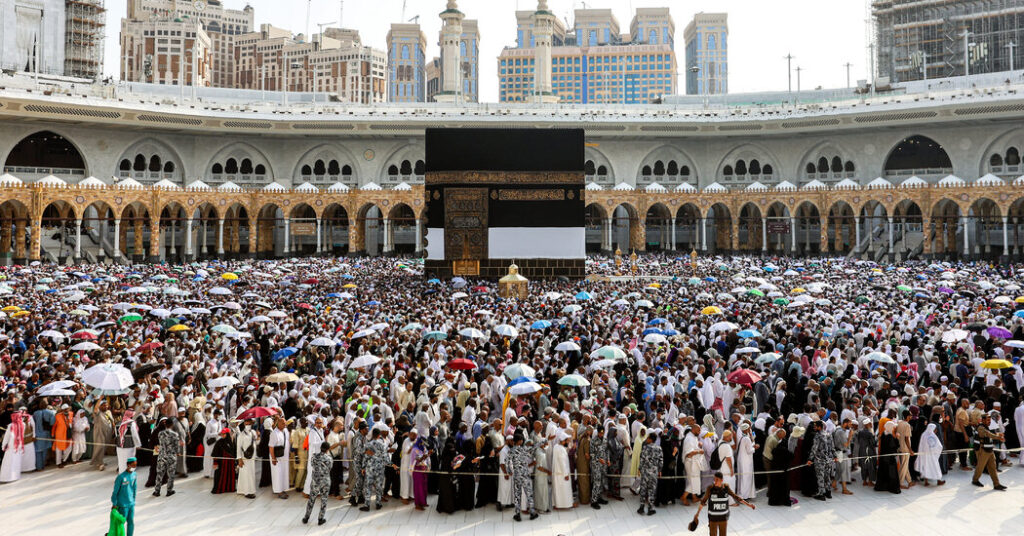At least 450 people have died in the scorching sun during Saudi Arabia’s annual hajj, one of the most important events on the Muslim calendar, as they prayed at holy sites around the holy city of Mecca.
at maximum temperature Temperatures ranged from 108 degrees Fahrenheit to 120 degrees Fahrenheit, and crowds were so crowded that many people passed out and required medical attention, according to preliminary data. Pilgrims, some of whom have sacrificed their lives for the pilgrimage, walk for days and sleep in tents on their way to Mecca, Muslims’ holiest city. Hajj is one of the five pillars of Islam, and all Muslims with physical or financial ability are obliged to embark on the pilgrimage.
Indonesia has reported the highest number of deaths so far, with 199, while India has reported 98. is a contributing factor.
The death toll is expected to rise as neither Saudi Arabia nor Egypt, from which many of the pilgrims come, have announced deaths of their own citizens.
Egypt is so alarmed that it has set up crisis centers to receive distress calls and coordinate the government’s response as many people are reported missing and families face a high death toll.
More than 1.8 million Muslims have traveled to Mecca this year, including 1.6 million from outside Saudi Arabia, according to the Saudi Arabian Bureau of Statistics.
Many complained that there were not enough cooling stations or water for all pilgrims, and early reports suggested that part of the problem was that many people were not officially registered for the pilgrimage, possibly to avoid the high cost of hajj travel.
Many of the pilgrims are elderly and have spent years saving to travel to the holy city. Before and during Eid al-Adha, pilgrims visit several holy sites, including circumambulating the Kaaba and praying on Mount Arafat.
On a Hajj Facebook group with more than 900,000 members, Egyptians launched an appeal for missing relatives. Among them, a woman left a message to her mother: “Mom, I am Rabab. I will wait for you outside King Khalid Bridge… Please refer to this article. I die for you. You are the light in my eyes.”
Other countries reporting deaths include Jordan, Tunisia and Pakistan.
Jordan’s foreign ministry said an “intense heat wave” killed 75 pilgrims.
Tunisia’s Religious Affairs Minister Ibrahim Chaibi said 49 Tunisians had died. He said the number was expected to rise as the number of pilgrims traveling on tourist visas became clearer, according to Tunisia’s official news agency.
An Egyptian travel agency said that due to the rising costs of Hajj and group tours and the depreciation of the Egyptian pound, many pilgrims have chosen tourist visas, which has put a burden on facilities in Mecca and surrounding holy places.
The man from Mecca described the dire plight of unregistered pilgrims. He, who spoke on condition of anonymity for security reasons, said the unregistered pilgrims had no tents and were exposed to the sweltering heat. He said there were too few buses, so many pilgrims walked more than 12 miles.
Hind Hassan, from Egypt, said her aunt Safa Tawab died during the hajj and that the tour company that arranged her trip withheld the news until her family posted it online Her name was found on the list of the dead.
Ms Hassan said a friend accompanying Ms Tawab, 55, told her family the pilgrimage was like “walking on the path of death because of the heat and lack of water”.
Mahmoud Qassem, a member of Egypt’s parliament, accused shady travel agencies of “exposing Egyptian pilgrims to deception and fraud by tour companies” and called for a police investigation.
London-based global aid agency Islamic Relief has been warning since 2019 about the impact of climate change on the hajj.
“If the world’s emissions continue as usual, temperatures in Mecca will rise to levels that the human body cannot cope with,” Shahin Ashraf, the group’s head of global initiatives, said in an emailed statement on Friday.
In Pakistan, at least 35 people have been killed, according to official figures, as mourners gathered to remember the dead. Dozens of people in Chaman, a city in Balochistan province on the border with Afghanistan, paid their respects outside the home of Abdul Bari Kakar. Kakkar, 49, who ran a gas cylinder shop, had been saving money for several months to prepare for his third trip, his relatives said.
His son Sardar Wali said he chose to “pray for his grandfather who died many years ago”.
“We are saddened by his passing,” he said, “but he was lucky to die in the Holy Land.”
Hager Elhakeem contributed reporting from Luxor, Egypt; Christina Goldbaum Zia ur-Rehman is from Pakistan, Muktita Suhartono from Indonesia and Judson Jones reported in Atlanta.

